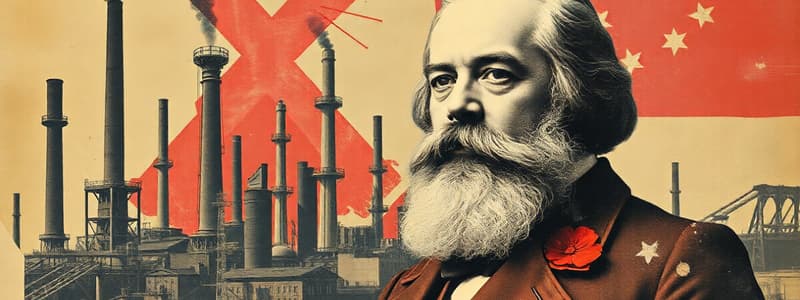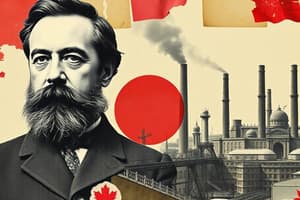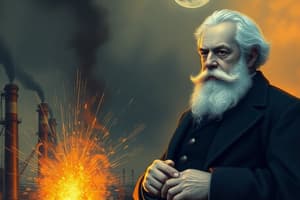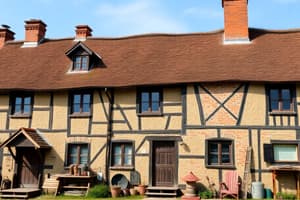Podcast
Questions and Answers
How did advancements in agricultural technology during the Food/Agricultural Revolution contribute to the onset of the Industrial Revolution?
How did advancements in agricultural technology during the Food/Agricultural Revolution contribute to the onset of the Industrial Revolution?
- By decreasing the availability of food, forcing people to migrate to urban centers in search of sustenance.
- By limiting the amount of land available for farming, driving up food prices and reducing overall economic output.
- By promoting self-sufficiency among rural populations, decreasing the need for trade and economic interaction with urban merchants.
- By increasing the efficiency of food production, leading to a surplus of labor that migrated to urban areas for work in factories. (correct)
Which of the following reflects a significant way in which the Industrial Revolution influenced social structures?
Which of the following reflects a significant way in which the Industrial Revolution influenced social structures?
- The decline of nationalism as people began to identify more with their social class than their nation.
- An increase in the power and social standing of the aristocracy as they adapted to industrial production.
- The rise of a distinct working class concentrated in urban centers. (correct)
- A decrease in the overall population due to widespread famine and disease.
What was a primary ideological challenge that Charles Darwin's work posed during the 19th century?
What was a primary ideological challenge that Charles Darwin's work posed during the 19th century?
- It supported the prevailing social hierarchies and strengthened the authority of the aristocracy.
- It promoted the principles of Romanticism by emphasizing the beauty and harmony of nature.
- It directly contradicted prevailing religious accounts of the origin of species. (correct)
- It justified the expansionist policies of imperial powers by asserting the superiority of certain races.
How did the ideals of the French Revolution impact movements for independence in Latin America?
How did the ideals of the French Revolution impact movements for independence in Latin America?
What was one significant consequence of the Napoleonic Wars in Europe?
What was one significant consequence of the Napoleonic Wars in Europe?
In what way did the creation of railroads during the Industrial Revolution transform societies?
In what way did the creation of railroads during the Industrial Revolution transform societies?
How did the rise of nationalism in the 19th century affect existing empires and political structures?
How did the rise of nationalism in the 19th century affect existing empires and political structures?
What role did William Wilberforce play in the broader context of 19th-century social reform movements?
What role did William Wilberforce play in the broader context of 19th-century social reform movements?
What was the primary goal of Lewis and Clark's expedition in the early 19th century?
What was the primary goal of Lewis and Clark's expedition in the early 19th century?
How did the conditions of the working class during the Industrial Revolution contribute to the development of socialist thought, as exemplified by Karl Marx?
How did the conditions of the working class during the Industrial Revolution contribute to the development of socialist thought, as exemplified by Karl Marx?
Which factor most influenced Queen Victoria's reign and her role as a symbolic figure?
Which factor most influenced Queen Victoria's reign and her role as a symbolic figure?
How did the American Civil War contribute to the process of nation-building in the United States?
How did the American Civil War contribute to the process of nation-building in the United States?
Which of the following describes the relationship between expanding the frontier and the development of the United States?
Which of the following describes the relationship between expanding the frontier and the development of the United States?
What was the significance of the Storming of the Bastille during the French Revolution?
What was the significance of the Storming of the Bastille during the French Revolution?
How did Romanticism differ from the Enlightenment?
How did Romanticism differ from the Enlightenment?
What was a key difference between the French Revolution and the American Revolution?
What was a key difference between the French Revolution and the American Revolution?
How did the Imperialism of the 19th century affect the relationship between European powers and colonized regions?
How did the Imperialism of the 19th century affect the relationship between European powers and colonized regions?
What was one significant factor that contributed to urbanization during the Industrial Revolution?
What was one significant factor that contributed to urbanization during the Industrial Revolution?
What role did the Declaration of Independence play in shaping political thought during the late 18th century?
What role did the Declaration of Independence play in shaping political thought during the late 18th century?
What was a major outcome of the Seven Years War?
What was a major outcome of the Seven Years War?
Flashcards
Industrial Revolution
Industrial Revolution
A period of major industrialization that took place during the late 1700s and early 1800s.
Queen Victoria
Queen Victoria
The period of her reign was one of industrial expansion, cultural change, and the expansion of the British Empire.
Imperialism
Imperialism
A policy of extending a country's power and influence through colonization, use of military force, or other means.
Science vs. Religion
Science vs. Religion
Signup and view all the flashcards
Charles Darwin
Charles Darwin
Signup and view all the flashcards
Romanticism
Romanticism
Signup and view all the flashcards
Karl Marx
Karl Marx
Signup and view all the flashcards
Working Class
Working Class
Signup and view all the flashcards
Nationalism
Nationalism
Signup and view all the flashcards
Urbanization
Urbanization
Signup and view all the flashcards
Abraham Lincoln
Abraham Lincoln
Signup and view all the flashcards
Latin American Liberty
Latin American Liberty
Signup and view all the flashcards
Napoleon Bonaparte
Napoleon Bonaparte
Signup and view all the flashcards
William Wilberforce
William Wilberforce
Signup and view all the flashcards
Expanding the Frontier
Expanding the Frontier
Signup and view all the flashcards
American Civil War
American Civil War
Signup and view all the flashcards
The Napoleonic Wars
The Napoleonic Wars
Signup and view all the flashcards
French Revolution
French Revolution
Signup and view all the flashcards
Food/Agricultural Revolution
Food/Agricultural Revolution
Signup and view all the flashcards
Study Notes
- The Industrial Revolution spurred significant societal and economic changes.
- Queen Victoria's reign is often associated with the height of British Imperialism.
- Imperialism is the policy of extending a country's power and influence through colonization, use of military force, or other means.
- Charles Darwin's theory of evolution created a clash between science and religion.
- Romanticism was an artistic, literary, musical and intellectual movement that emphasized emotion and individualism.
- Karl Marx is known for his theories about capitalism and communism.
- The rise of the working class was a consequence of industrialization.
- Nationalism is identification with one's own nation and support for its interests, sometimes to the exclusion of the interests of other nations.
- Urban cities grew rapidly during the era of industrialization.
- Lewis and Clark are famous for their exploration of the American West.
- Urbanization is the process of increasing the population in urban centers.
- Abraham Lincoln led the United States during the American Civil War.
- Latin American leaders fought for liberty from colonial powers.
- Napoleon Bonaparte rose to prominence during the French Revolution and led several successful military campaigns.
- William Wilberforce campaigned for the abolition of slavery in Britain.
- The United States focused on expanding the Frontier westward through exploration, settlement, and often displacement of Native Americans.
- The American Civil War was fought between the Union and the Confederacy over slavery and states' rights.
- The Napoleonic Wars were a series of major conflicts pitting the French Empire and its allies against a fluctuating array of European powers.
- The French Revolution was a period of social and political upheaval in late 1700's France, ultimately toppling the monarchy.
- The National Assembly was a revolutionary assembly formed by representatives of the Third Estate of France.
- The Storming of Bastille was a pivotal event in the French Revolution.
- The Constitution established the United States' national government and fundamental laws, and guaranteed certain basic rights for its citizens.
- The Declaration of Independence declared the Thirteen Colonies independent from Great Britain.
- The Seven Years' War was a global conflict fought between 1756 and 1763.
- Industrialization is the process of transforming from an agrarian society to one based on manufacturing.
- Railroad creation revolutionized transportation and trade.
- The Food/Agricultural Revolution saw significant improvements in farming techniques and crop yields.
Studying That Suits You
Use AI to generate personalized quizzes and flashcards to suit your learning preferences.




